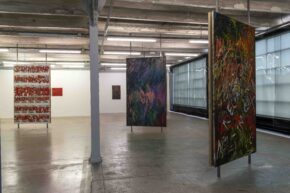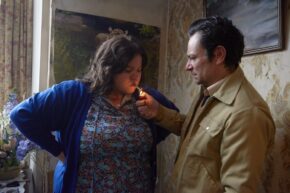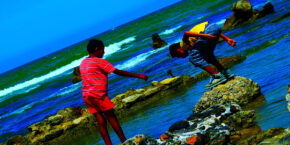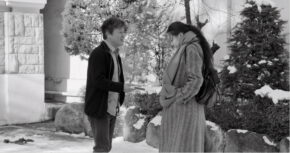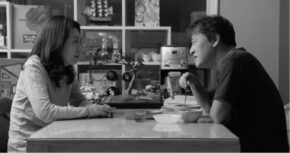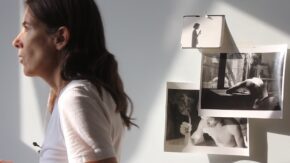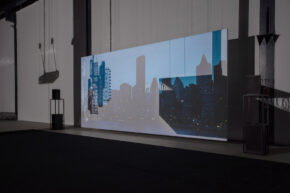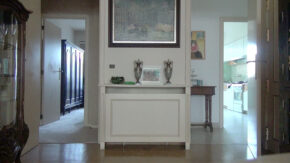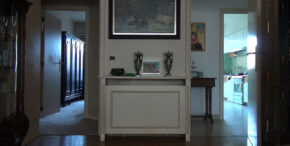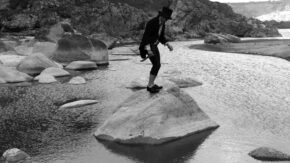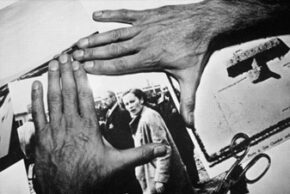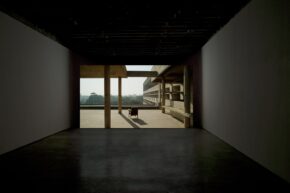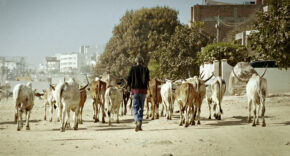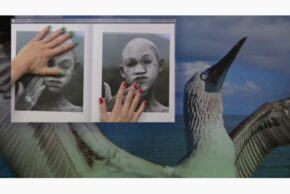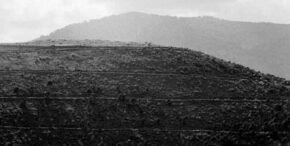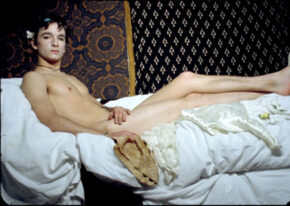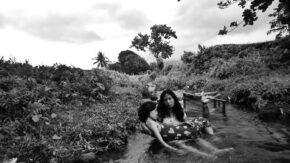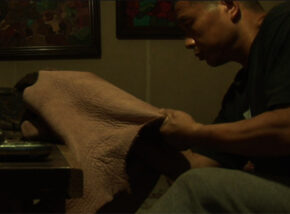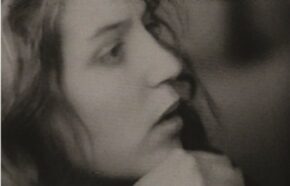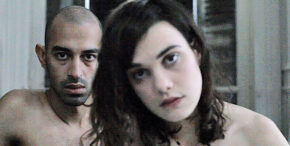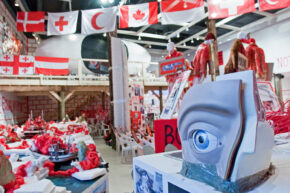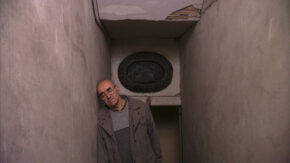Andrea Picard
Film/Art | Out of the Blue and Into the Black: Derek Jarman’s Dead Souls Whisper
By Andrea Picard | 03/21/2022 | Columns, CS90, Film - Art, From Cinema Scope Magazine
Undoubtedly, the most referenced colour in the history of art has been the colour blue; it is perhaps also the most magnificent. From its invention by the ancient Egyptians, to the painted parchment in medieval Psalters, through Renaissance brocades and vast perspectival grids defined by winsome skies to those manufactured by James Turrell via artificial light or real ones enhanced and framed like sculptures, blue has the undeniable lure and power of a paradoxical emotion: to excite yet appease.
Read More → Against Oblivion: Richard Billingham’s RAY & LIZ and Yervant Gianikian & Angela Ricci Lucchi’s I diari di Angela—Noi due cineasti
By Andrea Picard | 12/21/2018 | Columns, CS77, From Cinema Scope Magazine
By Andréa Picard “Right now a moment is fleeting by!”—Paul Cézanne “Memory demands an image.”—Bertrand Russell “I don’t make movies about my life. I live my life like a movie.”—Lana Del Rey How often has a film or artwork been praised for capturing or visually demonstrating the ineffable? But what about the indelible, that which…
Read More → The Image Book (Jean-Luc Godard, Switzerland/France) — Masters
By Andrea Picard | 09/07/2018 | Cinema Scope Online, TIFF 2018
By Andréa Picard Published in Cinema Scope 75 (Summer 2018) “There is a real contrast between the violence of the act of representation and the internal calm of representation itself.”—Le livre d’image Last summer, the Institut Lumière in Lyon run by Cannes chief Thierry Frémaux announced a full Godard retrospective for its annual restoration…
Read More → The Day After (Hong Sangsoo, South Korea) — Masters
By Andrea Picard | 09/03/2017 | Cinema Scope Online, TIFF 2017
By Andréa Picard Published in Cinema Scope 71 (Summer 2017) With its wonderful Whitman-inspired title, On the Beach at Night Alone gave us one of the year’s most indelible images, so crushing, mournful, and beautiful in its abandon: Kim Minhee’s character Younghee lying forlorn in the sand on a cold beach. The solemn distress and…
Read More → The Day After / Claire’s Camera (Hong Sangsoo, South Korea)
By Andrea Picard | 06/22/2017 | Columns, CS71, Festivals, From Cinema Scope Magazine, Spotlight
By Andréa Picard With its wonderful Whitman-inspired title, On the Beach at Night Alone gave us one of the year’s most indelible images, so crushing, mournful, and beautiful in its abandon: Kim Minhee’s character Younghee lying forlorn in the sand on a cold beach. The solemn distress and physical destitution occasioned by Liebeskummer was palpable…
Read More → Film/Art | News from Anywhere, Nowhere, Home: Notes on the BNLMTL
By Andrea Picard | 12/19/2016 | Columns, CS69, From Cinema Scope Magazine
“Le Grand Balcon” is the name of the brothel in Jean Genet’s 1957 play Le Balcon, where it serves as a “house of illusions” (as one of the characters calls it) rather than simply a house of pleasure or tolerance.
Read More → A Film/Art Hypothesis: Philippe Parreno at HangarBicocca
By Andrea Picard | 03/21/2016 | Columns, CS66, From Cinema Scope Magazine
By Andréa Picard L’année dernière à Marienbad (1961) is an enduring, mesmerizing modernist masterpiece. Perhaps the most powerful aspect of this Resnais/Robbe-Grillet collaboration—apart from its dapper design (including trimmed topiary) and Delphine Seyrig’s divinely breathy intonations and Chanel plumage—is its constant creation of spatial and temporal ambiguity, its perverse usurping of causal relationships between events…
Read More → Film/Art | We Can’t Go Home Again: Chantal Akerman’s No Home Movie
By Andrea Picard | 09/22/2015 | Columns, CS64, From Cinema Scope Magazine
By Andréa Picard “It is in a house that one is alone. Not outside of it, but inside. In the park there are birds, cats. Maybe even a squirrel, a ferret. We are not alone in a park. But in the house, we are so alone that we are sometimes lost.”—Marguerite Duras, Écrire Writing about…
Read More → TIFF 2015 | Cinema Scope 64 Preview | No Home Movie (Chantal Akerman, Belgium)—Wavelengths
By Andrea Picard | 09/02/2015 | Cinema Scope Online, TIFF 2015
Film/Art | We Can’t Go Home Again: Chantal Akerman’s No Home Movie By Andréa Picard Originally published in Cinema Scope 64 (Fall 2015). “It is in a house that one is alone. Not outside of it, but inside. In the park there are birds, cats. Maybe even a squirrel, a ferret. We are not alone…
Read More → Film/Art | Oh, Broodthaers, Where Art Thou?
By Andrea Picard | 06/23/2015 | Columns, CS63, From Cinema Scope Magazine
By Andréa Picard “Fiction captures the truth, and at the same time, what it conceals.”—Marcel Broodthaers “All the World’s Futures” is a pretty grim supposition, if not a dismal, somewhat dizzying “iterative choreography,” to quote this year’s Venice Biennale curator Okwui Enwezor. Those futures are in fact meant to be a barometer of the present,…
Read More → Film/Art | Carlos Amorales, Roberto Bolaño, and Amorality Within the Avant-Garde
By Andrea Picard | 12/18/2014 | Columns, CS61, From Cinema Scope Magazine
By Andréa Picard “We dreamed of utopia and we woke up screaming.”—Roberto Bolaño, First Infrarealist Manifesto Last year, Vogue Paris published an issue devoted to the “avant-garde,” seemingly another instance of mainstream popular culture co-opting the language and ethos of radical art and politics. At a certain juncture, this would not have seemed so…
Read More → Film/Art | Harun Farocki’s Inextinguishable Fire
By Andrea Picard | 09/16/2014 | Columns, CS60, From Cinema Scope Magazine
By Andréa Picard “The image always occurs on the border between two force fields; its purpose is to testify to a certain alterity, and although the core is always there, something is always missing. The image is always both more and less than itself.”—Serge Daney, Libération (reprinted in Devant la recrudescence des vols de sacs…
Read More → Film/Art | Provenance: The Artist (Amie Siegel)
By Andrea Picard | 03/20/2014 | Columns, CS58, From Cinema Scope Magazine
By Andréa Picard When Heidegger assigned the virtue of truth to works of art, he did so while heeding to his own tastes as any aesthete would. The origin of a work of art, he opined, is where said authenticity lies. Determining provenance is thus imperative to understanding the essence of an artwork, which significantly…
Read More → Film/Art | In the Realm of the Senses: Mati Diop on Mille soleils
By Andrea Picard | 12/13/2013 | Columns, CS57, From Cinema Scope Magazine
By Andréa Picard “This fever is a nightly invader that strikes the patient during deep sleep. He jumps off his bed and runs to the bridge. There, he believes seeing beyond the waves, trees, forests, flowered meadows. His joy erupts in thousand exclamations. He experiences the most burning desire to flow into the ocean.”—Atlantiques “You…
Read More → Film/Art | Camille Henrot: A Hunter-Gatherer During a Time of Collective “Grosse Fatigue”
By Andrea Picard | 08/28/2013 | Columns, CS56, From Cinema Scope Magazine
By Andréa Picard “Ideas are a complete system within us, resembling a natural kingdom, a sort of flora, of which the iconography will one day be outlined by some man who will perhaps be accounted a madman.”—Honoré de Balzac, Louis Lambert, 1832 “How, in A.D. 1988, is it that human ingenuity has been unable, firstly…
Read More → Film/Art | Out of Bounds: The Formal Trajectories of Lonnie van Brummelen & Siebren de Haan
By Andrea Picard | 03/21/2013 | Columns, CS54, From Cinema Scope Magazine
By Andréa Picard “You have to rack your brain to know how to film a location…You have to walk around it for a while if you want to find, to use a military term, a strategic lookout. There are not many. When you explore this question often enough, you see that, most of the…
Read More → Film/Art | In the Age of Contamination: Gabriel Abrantes’ Tall Tales and Tainted Love
By Andrea Picard | 12/16/2012 | Columns, CS53, From Cinema Scope Magazine
By Andréa Picard “Language just, I don’t know, confuses things. Crazy.”—Cookie, in The History of Mutual Respect Disarmingly direct, it’s a gaze that will forever symbolize the tantalizing transition into modernity, as if a single woman harboured the power to dismantle centuries’ worth of objectification, prescribed Victorian codes of conduct, and the dominion of man.…
Read More → Film/Art | Beware of the Jollibee: A Correspondence with Lav Diaz
By Andrea Picard | 06/24/2012 | Columns, CS51, From Cinema Scope Magazine
By Andréa Picard Twenty years ago, when under the rule of a sole dictator, we knew well whose wrists deserved to feel the sharp ends of our knives. Today, in a society so quick to judge and pass blame, the only flesh that remains to be examined is our own. Diaz’s camera, steadfast, unwavering, reveals…
Read More → Liu Jiayin
By Andrea Picard | 04/04/2012 | 50 Best FIlmmakers Under 50, CS50, From Cinema Scope Magazine
By Andréa Picard In praise of pockets—perhaps this is the essence of Liu Jiayin’s cinema to date. Like the handbags and dumplings whose real-time creation in her quietly astonishing diptych (soon to be a trilogy) of Oxhide (2005) and Oxhide II (2009) provide the films with their structuring principles, Liu’s wit, originality, and ingenious deployment…
Read More → Film/Art | Disappearances After the Revolution: On Alberto Grifi and Massimo Sarchielli’s Anna
By Andrea Picard | 04/04/2012 | Columns, CS50, From Cinema Scope Magazine
By Andréa Picard “As a filmmaker, I think we have to venture into the no man’s land that lies between reality and imagination, between documentation and fiction…Filming the impossible is what’s best in life.”—Joris Ivens “New languages aren’t invented in the editing phase, it is life undergoing a transformation that demands new languages…”—Alberto Grifi …
Read More → Film/Art | Low Life Zombies
By Andrea Picard | 09/29/2011 | Columns, CS48, From Cinema Scope Magazine
By Andréa Picard “Two types of film: those that employ the resources of the theatre (actors, directors, etc…) and use the camera in order to reproduce; those that employ the resources of cinematography and use the camera to create.” —Robert Bresson, Notes sur le Cinématographe “Art is like a fire; it is born out of…
Read More → Film/Art | In Das Auge of the Beholder: Thomas Hirschhorn and Bruno Dumont
By Andrea Picard | 06/29/2011 | Columns, CS47, From Cinema Scope Magazine
By Andréa Picard “The intellect may be compared to a carver, but it has the peculiarity of imagining that the chicken always was the separate pieces into which the carving-knife divides it.”—Bertrand Russell In Toronto in early March to put the final touches on his transplanted 2008 Secession sensation Das Auge (The Eye) at the…
Read More → Film/Art | There’s No Place Like Home: Absalon, Aitá, and Ocaso
By Andrea Picard | 03/12/2011 | Columns, CS46, From Cinema Scope Magazine
By Andréa Picard “These homes will be a means of resistance to a society that keeps me from becoming what I must become.”—Absalon “In Basque mythology the house or etxe is a sacred area where the living and the dead meet on equal terms.”— José Maria De Orbe The Israeli-born, Paris-dwelling sculptor Absalon chiselled his…
Read More → Columns | Film/Art
By Andrea Picard | 12/17/2010 | Columns, CS45, From Cinema Scope Magazine
In the enchanted land of pewter trees, Rohmer’s line describing a semi-circle By Andréa Picard “What gives truth to a Cézanne is not the pseudo-likeness to the model, it’s the trace it carries within it of the process by which the painter perceives it.” “Like painting, sculpture, architecture, and the ballet, the cinema is an…
Read More → Columns | Film Art | Orphans and Maniacs: Chantal Akerman’s Maniac Summer
By Andrea Picard | 03/17/2010 | Columns, CS42, From Cinema Scope Magazine
By Andréa Picard Whether ironic, playful or slightly self-deprecating, the title of Chantal Akerman’s Maniac Summer, recently exhibited at the Marion Goodman gallery in Paris is apt, bemusing, and applicable to many of her other works—at least the maniac part. Pathology is Akerman’s specialty, as she consistently delves into a cinema of solipsism, not unlike…
Read More → The Decade in Review | Andréa Picard
By Andrea Picard | 03/16/2010 | CS42, The Decade In Review
A decade of remembering (or, Avant que j’oublie) Literally. Or the fear of forgetting. From Godard’s elegiac Éloge de l’amour (an anguished apologia for the ramshackle installation to come—another of the decade’s most memorable moments strewn amid the ruins of abandoned thought), perhaps the most poignant and prescient statement of the ‘00s (one plus one), not…
Read More → Columns | Film/Art – In Comparison: HF | RG
By Andrea Picard | 12/16/2009 | Columns, CS41, From Cinema Scope Magazine
By Andréa Picard This column is so late, it’s as good as expired. And alas, it’s not even the article it once was or was meant to be. Blame it on the archive (or lack thereof) and the machine (ditto), definitely on the so-called nonverbal and a rather limp attempt at montage. In late August,…
Read More → Columns | FILM/ART: Reading Between the Lines with Bruce McClure
By Andrea Picard | 09/03/2009 | Columns
By Andréa Picard “I think an artist is always working with limits, but these limits are extended and discovered. There’s an art of discovering new limits.”—Robert Smithson “After all, wreckage is often more interesting than structure.”—Bruce McClure Bruce McClure is an artist both increasingly known and unknown. His film performances have been featured (and cultishly…
Read More → Columns | FILM/ART: This Time Tomorrow: The Zanzibar Films
By Andrea Picard | 09/01/2009 | Columns
By Andréa Picard “One of the notable events in the art-world in the last few years is that Mannerism has again become fashionable…It is, in a phrase, the stylish style.”—John Sherman, 1965 Even Mannerism, the 16th century visual, literary, and musical style—that ne plus ultra of all bêtes noires—has bobbed in and out of vogue.…
Read More → Columns | FILM/ART Featuring Michel Auder
By Andrea Picard | 09/01/2009 | Columns
By Andréa Picard “Usually, you eat, you get laid, you’re worried about money, you have money, you’re happy, you’re sad, you cry, you have more sex, if you’re lucky, and then, you know, there’s nothing left in life, it’s just what it is.”—Michel Auder in The Feature Watching The Feature, vidéaste Michel Auder’s return to…
Read More → Columns | FILM/ART A Paradox: Remembering Guillaume Depardieu
By Andrea Picard | 08/29/2009 | Columns
By Andréa Picard “Paradoxe.” You must call it “Paradoxe,” he said in French, his famously crooked smile as wide as his eyes were squinty and full of play. Incredibly, I sat directly opposite Guillaume Depardieu exactly one year ago, in what was to be my first and as of yet only mock interview—a staggering 45…
Read More → 
